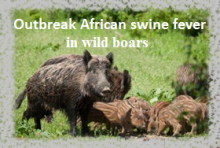Situation in Belgium
Identification of African swine fever (ASF) in wild boars in Belgium in September 2018 – Free status OIE in all suidae recovered on the 1st of October 2020
The disease has never affected domestic swine and was eradicated from wild boar in the fall of 2019.
The ASF free status in all swine at the European Union level (lifting of the European Commission regulated areas) and at the OIE level (self-declaration approved and published) was regained one year later, in autumn 2020, in accordance with the respective rules in force of these organizations.
For more detailed information please consult the document self-declaration "free status of ASF for all suidae".
-
OIE official attestation: self-declaration "free status of ASF for all suidae" (01/10/2020, approved by the OIE 22/12/2020)
Belgium has always remained free of ASF in domestic pigs :
-
OIE official attestation: self-declaration "free status of ASF for domestic and wild pigs kept in captivity"
On the 22nd of December 2020, the OIE (World Organisation for Animal Health) approved and published the "all swine" free status of Belgium, which was regained on 1 October 2020.
On the 20th of November 2020, Belgium has obtained its ASF free status at an European level as the European Commission approved the lifting of the ASF regulated zones. Thus, Belgium shall no longer appear on the maps of the European countries were ASF is present.
The European Commission decision has been published on the 23/11/2020. (Commission implementing decision (EU) 2020/1741).
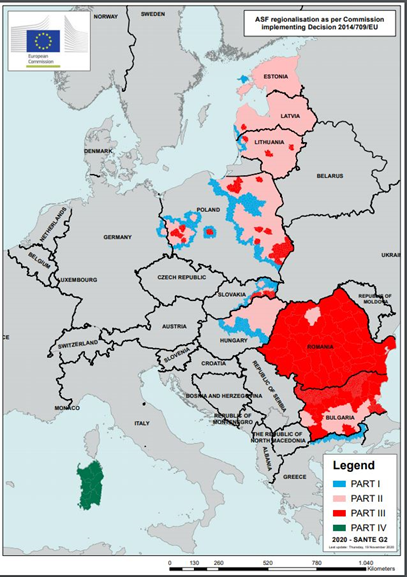
|
Up until the 17th of November 2020, 5422 wild boar have been analyzed for ASF, among which 833 have been confirmed positive for African swine fever (ASF).
The last positive case confirmed on a fresh carcass dates from the 11th of August 2019.
The search for dead carcasses of wild boar has been intensified since the beginning of autumn 2019. The 6 cases identified after the 11th of August 2019 have all been confirmed on the remains (only bones) of wild boar that died several months before the discovery of the bones *:
- September 2019: 0 cases
- October 2019: 1 case
- November 2019: 1 case
- December 2019: 1 case
- January 2020: 1 case
- February 2020: 1 case
- March 2020: 1 case
The following map details the situation on the field since the beginning of the outbreak and during the months of March and April 2020 :
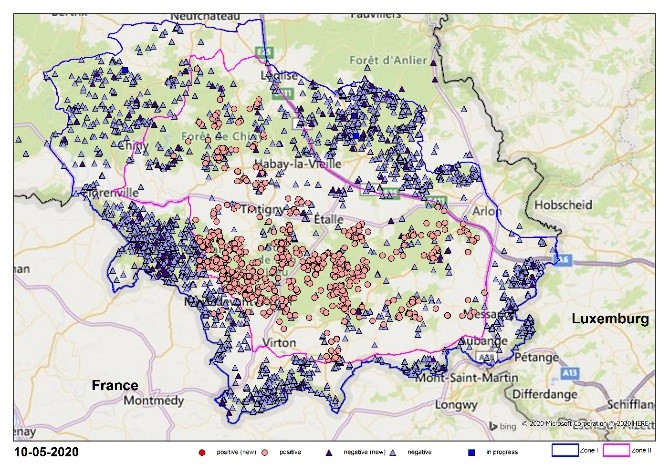
|

|
Since September 2018, when the first cases of African swine fever were discovered in wild boar in the south of Belgium, the regulated zones I and II, that were put in place as one of the measures of ASF containment, have been adapted several times.
Following the discovery of the first ASF cases in wild boar, an initial infected zone was set. In November 2018, the European regulated zones were put in place: zone I (buffer zone) and zone II (infected zone).
As it can be seen in the map hereunder, the zones concerned by the ASF outbreak occupy a small territory in the south of Belgium:
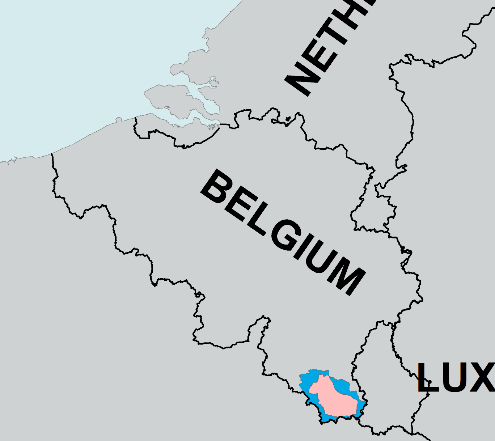 |
The maps hereunder show the evolution of these zones over the time, starting from September 2018 up until May 2020.
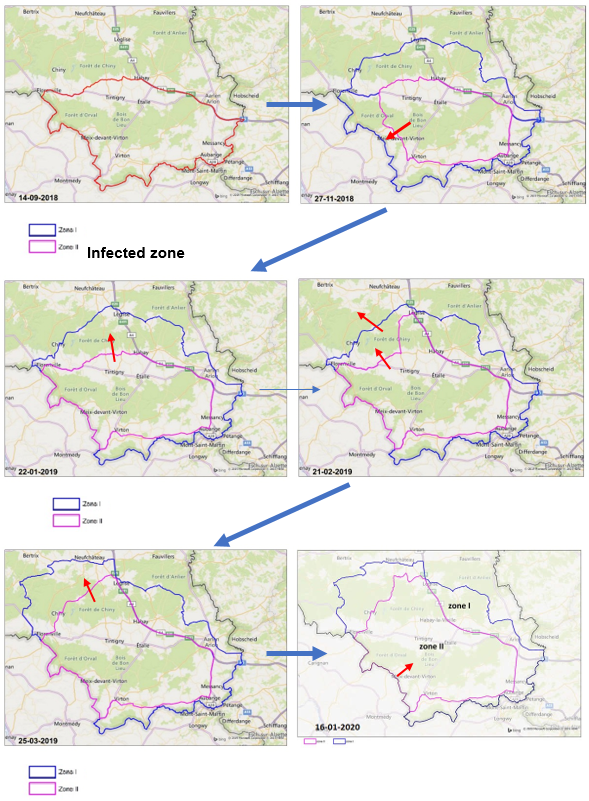 |
Since the 18th of May 2020, the regulated zones were adapted as shown on the map hereunder:
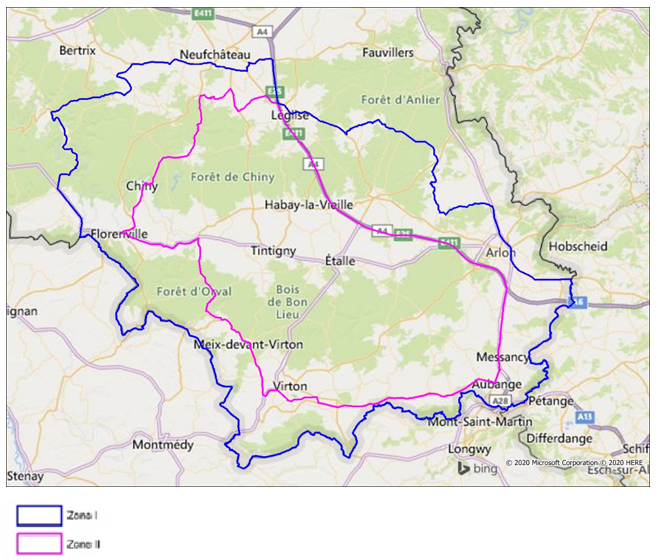 |
On the 23th of November 2020, the European Commission decided to lift the regulated zones.
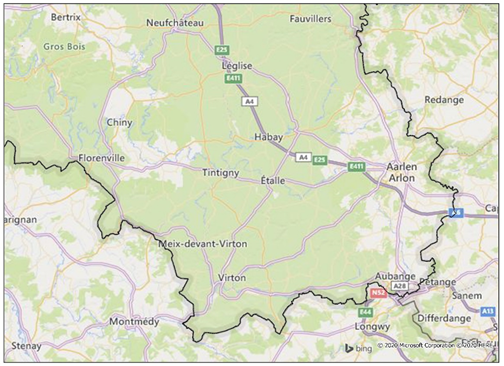
|
* Found bones were completely dry and emaciated. The age of the bones (and consequently the date of death of the boars) was evaluated by analyzing the presence of remnant DNA (cf. article J. Samsuwan,T. Somboonchokepisal, T. Akaraputtiporn,T. Srimuang, P. Phuengsukdaeng, A.Suwannarat, A. Mutirangura, N. Kitkumthorn – “A method for extracting DNA from hard tissues for use in forensic identification”, Biomed Rep. 2018 Nov; 9(5): 433–438).
History
On the 13th of September 2018, African swine fever (ASF) virus was confirmed for the first time since 1985 in 2 wild boars in the municipality Etalle (province of Luxembourg). In this region very few domestic pigs are kept (most swine farms are located in the northern part of Belgium).
The Federal minister of Agriculture has decided to eradicate all domestic swine in the infected zone by 2 October 2018. It must be made very clear that his is merely a preventive eradication to prevent the contamination of domestic swine and to protect animal health and the commercial interests of the Belgian Pork industry. It is certain that products of these eradicated swine will not enter the food chain or be used for the feed industry. Compensation for the destroyed domestic swine of all affected farmers will be provided by the Sanitary Fund (Belgian) and European funds, reserved for animals disease outbreaks. Other economic compensation will be provided by the Walloon Region.
It should be emphasized that the potential risk lies in the spreading from wild boars to domestic and captive wild pigs, but that this risk is very limited since the necessary measures are taken.
There are no outbreaks in domestic swine.
No domestic and captive swine remain in the initial infected zone (decision of the Federal minister of Agriculture to eradicate all domestic swine by 2 October 2018).
Strict measures have been taken for the whole country to prevent contamination of domestic swine.
Based on European legislation and following consultation with the federal authorities and regional Walloon authorities, the initial "infected zone" has been replaced on the 27th of November 2018 by two separate zones: "Zone I" and "Zone II". This formal decision is imposed by European legislation in the context of zoning and protection measures against ASF, according to the identified risk. (see map below).
Important to know
-
African swine fever was limited to wild boars in a small area of the southern part of Belgium, there are no outbreaks in domestic swine, and the necessary and preventive measures are taken to control and avoid dissemination of the disease.
-
All domestic swine in the initial infected zone has been eradicated under the supervision of the FASFC and the repopulation of farms in this zone is forbidden. No products of these eradicated swine entered or will enter the food chain or will be used in the feed industry.
-
Notwithstanding, the certification conditions laid down in the relevant protocols concluded between Belgium and the non-EU countries (third countries) will be scrupulously respected.
Press releases and additional information are available on the website of the Federal Agency for the Safety of the Food Chain :
-
http://www.favv-afsca.fgov.be/professionnels/publications/presse/2018/2018-09-13.asp
-
http://www.favv-afsca.fgov.be/professionnels/publications/presse/2018/2018-11-23.asp
Contact:
Dr. Vet. Philippe Houdart
Head of the Crisis Prevention Department
Tel.: +32 (0) 2 211 82 81
Mobile number: +32 (0) 478 50 01 72
Mail: philippe.houdart@favv-afsca.be
European and Belgian following the annexes of the Commission Implementing Decision 2014/709/EU:

OIE : Notification, reports and official attestation (self-declaration)

